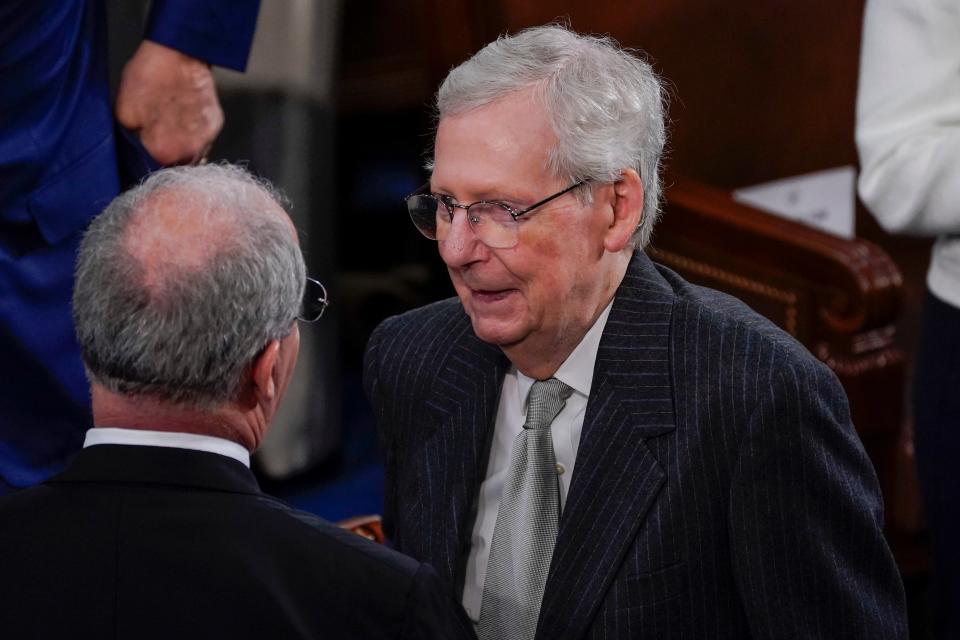Ukraine aid has stalled in Congress, but a Trump-backed plan is picking up steam
- Oops!Something went wrong.Please try again later.
WASHINGTON – As aid to Ukraine has stalled in the halls of Congress, interest is growing in the idea of delivering funds to the war-torn nation as a loan, a proposal first floated by former President Donald Trump.
Several powerful Ukraine advocates are still pushing the House to take up the $95 billion spending package the Senate passed in February with bipartisan support. It’s stuck in the lower chamber, with hard-right opposition stopping its advancement.
That bill would send $60 billion to Ukraine, though much of the funding would go to U.S. defense contractors or the Department of Defense to offset aid that has already been shared.
The rest, however, could be provided in the form of a no-interest, waivable loan, Trump said on the campaign trail last month. The former president has come out against the Senate-passed Ukraine aid as is, putting additional pressure on House Republicans to oppose it.
Sen. Lindsey Graham R-S.C., floated the loan idea to Ukrainian President Volodymyr Zelenskyy in Kyiv on Monday, saying it is “the most likely path forward.” Ukrainian Foreign Minister Dmytro Kuleba didn’t shoot it down Tuesday.
Later, House Speaker Mike Johnson, R-La. called the loan idea “a common sense suggestion.”
The speaker said it would likely mirror what was done in the Marshall Plan, a post-World War II program that provided $13.3 billion in funding to European countries, $1.5 billion of which were loans.
"These are not brand new ideas, these things have been around for a while,” Johnson said Wednesday. “But I think that makes sense to a lot of people.”
He added that there have also been discussions about asking Ukraine to provide the U.S. with rare earth minerals in exchange for aid. “But we have to see what that looks like, and we're talking about it in detail," Johnson cautioned.
'Whatever it takes'
Some House and Senate lawmakers aren't excited about providing much-needed funds to Ukraine in the form of a loan, but they said they remain open to the push.
Sen. Joni Ernst, R-Iowa, told USA TODAY she spoke with House Foreign Affairs Chairman Mike McCaul, R-Texas, about “different ideas to help them get that aid bill to the finish line.”
She said a loan is “probably not my favorite idea, but it is one that I would support, absolutely, if that helps us get it done.”
Sen. Marco Rubio, R-Fla., said: “I’m not against it. From the Ukrainians point of view, at this point they’re going to take aid any way they can get it.”
The tenor was similar among avid Ukraine supporters in the House, including those who have vocally backed the Senate's previous deal.
Rep. Brian Fitzpatrick, R-Pa., has sponsored a petition to force a vote on the House floor on Ukraine aid. He said he’d support a loan, “as long as it doesn’t slow down the delivery.”
Opposition to providing additional funds to Ukraine has swelled among some ultraconservative lawmakers over the last year, with leaders arguing that the U.S. has done enough. But with a loan-based plan touted by Trump, the idea might clear the way for Congress' supporters of Ukraine aid to reach the end zone.

Will lawmakers agree on a loan?
Both Republican and Democratic leadership in the Senate maintain that the supplemental aid bill is the best way to get funding to Ukraine because it's already passed. They argue it would also likely have enough votes on the House floor.
“What I’ve said repeatedly is we’re running out of time,” Senate Minority Leader Sen. Mitch McConnell, R-Ky., told reporters Wednesday. “The best way to get Ukraine the help they need is for the House to pass the Senate bill.”
House Democratic Caucus Chair Pete Aguilar, D-Calif., said a loan would require working through some legal issues with allies and the Biden administration, time spent hammering out the complexities of an international agreement.
“All of that takes time. We want the fastest, most certain path to aid going to Ukraine.”
But some Democrats, desperate to get funding to the country that is running out of resources to resist Russian attacks, are saying they’d be willing to consider a loan if the supplemental package the Senate approved won’t move.
Senate Foreign Relations Chair Sen. Ben Cardin, D-Md., said on “Meet the Press” on Sunday that the supplemental is his preferred way because “if we try a different path it’s going to take a long time.
But “if we can’t do anything other than that, we might have to consider” a loan, he said.
The Biden administration has also addressed the proposal as it picks up speed. White House national security spokesman John Kirby didn’t rule out the possibility of a loan when contacted by USA TODAY on Tuesday.
Sen. Jeanne Shaheen, D-N.H., another member of the Senate Foreign Relations Committee, noted that she, Cardin, and Sens. John Cornyn, R-Texas and Roger Wicker, R-Miss., had previously proposed a “lend-lease” style aid program for Ukraine.
“Anything that we can do to ensure that we get assistance to them is important,” Shaheen told USA TODAY. “If that’s the way we have to do it, then we should look at that as an option.”
This article originally appeared on USA TODAY: Sending Ukraine aid as a loan? Congress may pass a Trump-backed plan

